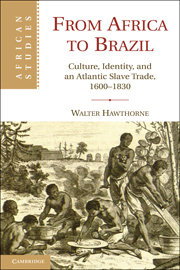Crossref Citations
This Book has been
cited by the following publications. This list is generated based on data provided by Crossref.
Thurston, Thomas
2011.
SLAVERY: ANNUAL BIBLIOGRAPHICAL SUPPLEMENT (2010).
Slavery & Abolition,
Vol. 32,
Issue. 4,
p.
607.
Wagner, Stephen
2011.
Recent Literature in Discovery History.
Terrae Incognitae,
Vol. 43,
Issue. 2,
p.
160.
2012.
Cross-Cultural Exchange in the Atlantic World.
p.
52.
Candido, Mariana P.
and
Hébrard, Jean
2012.
Aguida Gonçalves da Silva, une dona à Benguela à la fin du xviiie siècle.
Brésil(s),
Vol. 1,
Issue. ,
p.
33.
Kananoja, Kalle
2013.
Pai Caetano Angola, Afro-Brazilian Magico-Religious Practices, and Cultural Resistance in Minas Gerais in the Late Eighteenth Century.
Journal of African Diaspora Archaeology and Heritage,
Vol. 2,
Issue. 1,
p.
18.
Nafafé, José Lingna
2013.
Europe in Africa and Africa in Europe.
European Journal of Social Theory,
Vol. 16,
Issue. 1,
p.
51.
Kananoja, Jelmer Vos and Kalle
2013.
The Encyclopedia of Global Human Migration.
Lindsay, Lisa A.
2014.
EXTRAVERSION, CREOLIZATION, AND DEPENDENCY IN THE ATLANTIC SLAVE TRADE.
The Journal of African History,
Vol. 55,
Issue. 2,
p.
135.
Sarr, Assan
2014.
Land, Power, And Dependency along the Gambia River, Late Eighteenth to Early Nineteenth Centuries.
African Studies Review,
Vol. 57,
Issue. 3,
p.
101.
Fields-Black, Edda L.
2015.
Atlantic rice and rice farmers: rising from debate, engaging new sources, methods, and modes of inquiry, and asking new questions.
Atlantic Studies,
Vol. 12,
Issue. 3,
p.
276.
Mota, Aurea
and
Delanty, Gerard
2015.
Eisenstadt, Brazil and the multiple modernities framework: Revisions and reconsiderations.
Journal of Classical Sociology,
Vol. 15,
Issue. 1,
p.
39.
Fennell, Christopher C.
2015.
Current Perspectives on the Archaeology of African Slavery in Latin America.
p.
99.
Candido, Mariana P.
2015.
Engendering West Central African History: The Role of Urban Women in Benguela in the Nineteenth Century.
History in Africa,
Vol. 42,
Issue. ,
p.
7.
Rodrigues, Lúcia Lima
Craig, Russell James
Schmidt, Paulo
and
Santos, José Luis
2015.
Documenting, monetising and taxing Brazilian slaves in the eighteenth and nineteenth centuries.
Accounting History Review,
Vol. 25,
Issue. 1,
p.
43.
Hawthorne, Walter
2015.
Comparing slavery in Brazil and Cuba.
Atlantic Studies,
Vol. 12,
Issue. 4,
p.
545.
Hunt, Peter
2016.
On Human Bondage.
p.
55.
Hawthorne, Walter
and
Lingna Nafafé, José
2016.
The historical roots of multicultural unity along the Upper Guinea Coast and in Guinea-Bissau.
Social Dynamics,
Vol. 42,
Issue. 1,
p.
31.
Domingues da Silva, Daniel B.
Eltis, David
Khan, Nafees
Misevich, Philip
and
Ojo, Olatunji
2017.
The transatlantic Muslim diaspora to Latin America in the nineteenth century.
Colonial Latin American Review,
Vol. 26,
Issue. 4,
p.
528.
Pinto, Ofélia
and
West, Brian
2017.
Accounting and the history of the everyday life of captains, sailors and common seamen in eighteenth-century Portuguese slave trading.
Accounting History,
Vol. 22,
Issue. 3,
p.
320.
Pinto, Ofélia
and
West, Brian
2017.
Accounting, slavery and social history: The legacy of an eighteenth-century Portuguese chartered company.
Accounting History,
Vol. 22,
Issue. 2,
p.
141.



